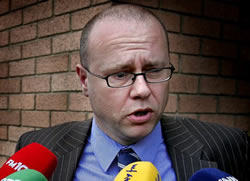 Unions have told the Irish Government they consider the new €900 million ($A1,400 million) Public Service Agreement as a “holding deal” and want pay talks to resume by the middle of next year.
Unions have told the Irish Government they consider the new €900 million ($A1,400 million) Public Service Agreement as a “holding deal” and want pay talks to resume by the middle of next year.
The current agreement has been overwhelmingly ratified by unions affiliated to the Irish Congress of Trade Unions.
It provides for pay increases of one per cent next October, or €500 ($A778), whichever is greater, and a further one per cent in October 2022.
The agreement also sets aside a further pool of money, equivalent to a further one per cent, for sectoral bargaining to deal with issues, pay claims or outstanding awards in particular parts of the Public Service.
In addition, a new independent body will be established to examine the additional hours without additional pay introduced for groups in the Public Service under the previous Haddington Road austerity agreement in 2013.
A fund of €150 million ($A233.4 million) is being established to cover any operational costs that will arise as a result of the recommendations on the future of these hours during the lifetime of the agreement.
Minister for Public Expenditure, Michael McGrath said the agreement was fair, affordable and sustainable.
“At a time of great uncertainty, it offers stability for both Public Servants and the public who rely on the vital services they provide,” Mr McGrath said.
General Secretary of Fórsa, the country’s largest public sector union, Kevin Callinan (pictured) said that affiliated unions were committed to the full implementation of the agreement which would bring tangible benefits to those who used and provided public services.
“The pay terms represent a realistic and acceptable approach to incomes, and they are substantially skewed towards lower earners in a very challenging context of limited resources,” Mr Callinan said.
“However, the extraordinary contribution of health workers in the battle against the pandemic needs to be recognised,” he said.
Mr Callinan said this would be raised with the Government “in the right way and at the right time”.
Dublin, 24 February 2021











